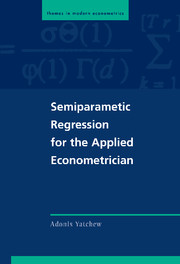Book contents
- Frontmatter
- Contents
- List of Figures and Tables
- Preface
- 1 Introduction to Differencing
- 2 Background and Overview
- 3 Introduction to Smoothing
- 4 Higher-Order Differencing Procedures
- 5 Nonparametric Functions of Several Variables
- 6 Constrained Estimation and Hypothesis Testing
- 7 Index Models and Other Semiparametric Specifications
- 8 Bootstrap Procedures
- Appendixes
- References
- Index
8 - Bootstrap Procedures
Published online by Cambridge University Press: 15 December 2009
- Frontmatter
- Contents
- List of Figures and Tables
- Preface
- 1 Introduction to Differencing
- 2 Background and Overview
- 3 Introduction to Smoothing
- 4 Higher-Order Differencing Procedures
- 5 Nonparametric Functions of Several Variables
- 6 Constrained Estimation and Hypothesis Testing
- 7 Index Models and Other Semiparametric Specifications
- 8 Bootstrap Procedures
- Appendixes
- References
- Index
Summary
Background
Introduction
Bootstrap procedures, widely attributed to Efron (1979), are simulation-based techniques that provide estimates of variability, confidence intervals, and critical values for tests. The fundamental idea is to create replications by treating the existing data set (say of size n) as a population from which samples (of size n) are obtained. In the bootstrap world, sampling from the original data becomes the data-generating mechanism (DGM). Variation in estimates occurs because, upon selection, each data point is replaced in the population.
In many circumstances, bootstrap procedures are simpler to implement than their asymptotic counterparts. In addition, they are often more accurate. By drawing correctly sized samples from the original data the simulated distribution inherits higher-order moment properties of the true DGM. The conventional asymptotic normal approximation ignores such information.
It is not surprising that major advances in bootstrap techniques and nonparametric procedures have occurred more or less contemporaneously. Both have been driven by the precipitous drop in computing costs. The emergence of automated data collection – which has produced very large data sets – has also contributed indirectly to the development of nonparametric techniques. Furthermore, although the bootstrap requires resampling many times, calculations need not be done serially but can be performed contemporaneously, making the bootstrap particularly suitable for parallel processing.
Bootstrap Procedures
We begin with a rudimentary introduction to the bootstrap. (References for further reading in this voluminous literature are provided at the end of this section.) This is followed by a delineation of several bootstrap techniques in nonparametric and semiparametric settings. Throughout this chapter, the superscript B will signify a bootstrap sample, estimate, confidence interval, or test statistic.
Information
- Type
- Chapter
- Information
- Semiparametric Regression for the Applied Econometrician , pp. 154 - 172Publisher: Cambridge University PressPrint publication year: 2003
